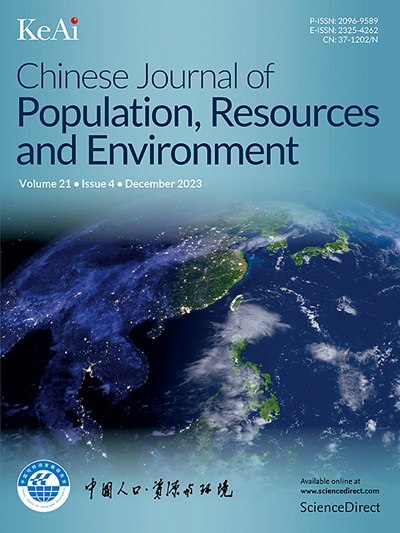释放农民参与乡村旅游与其生态足迹之间的联系:中国农村新兴的环境主体性
IF 4.8
4区 环境科学与生态学
Q2 ENVIRONMENTAL STUDIES
Chinese Journal of Population Resources and Environment
Pub Date : 2025-06-01
DOI:10.1016/j.cjpre.2025.05.011
引用次数: 0
摘要
以旅游业为导向的生计是改变传统农业做法的重要途径。分析其对环境的影响,为在微观层面上探索人类生产、消费与生态环境之间复杂的相互作用提供了新的视角。本研究选取陕西省农民作为实地调查对象。在对研究区农民生态足迹进行定量评价的基础上,运用倾向得分匹配模型分析了农民参与乡村旅游对生态足迹的影响,并进一步探讨了影响的异质性及其机制。结果表明,农户生态足迹在不同土地利用类型和消费类别之间存在显著差异。生态足迹的空间分布呈现出明显的“两端高,中间低”的格局。参与乡村旅游可显著减少生态足迹,特别是在社会信任度较高或经济地位较低的农民中。进一步分析表明,栖息地质量和植被覆盖度是乡村旅游参与对农民生态足迹负向影响的关键生态指标,对乡村旅游参与对农民生态足迹的负向影响具有显著的正向调节作用。这些发现突出了生态保护与经济发展相结合的重要性。因此,建议制定相应的政策,完善生态服务体系,提高区域生态质量,以提高资源利用效率,促进环境可持续性与农村经济增长的良性循环。本文章由计算机程序翻译,如有差异,请以英文原文为准。
Unleashing the nexus between farmers’ participation in rural tourism and their ecological footprint: Emerging environmental subjectivities in rural China
Tourism-oriented livelihoods represent a significant avenue for transforming traditional agricultural practices. Analyzing their environmental impacts offers a novel perspective for exploring the complex interplay among human production, consumption, and the ecological environment at a micro level. In this study, Shaanxi Province farmers were selected as field survey participants. Based on a quantitative assessment of farmers’ ecological footprints within the study area, how their participation in rural tourism affected ecological footprints was analyzed using the propensity score matching model, and the heterogeneity of the impact and underlying mechanisms were further explored. Results indicate that the ecological footprint of farmers varies significantly across land-use types and consumption categories. Moreover, the spatial distribution of the ecological footprints exhibits a distinct “high at both ends and low in the middle” pattern. Participation in rural tourism significantly reduces the ecological footprint, particularly among farmers with higher levels of social trust or lower economic status. Further analysis shows that habitat quality and vegetation coverage are key ecological indicators that exert a significant positive moderating effect on the negative impact of rural tourism participation on farmers’ ecological footprints. These findings highlight the importance of integrating ecological conservation with economic development. Accordingly, tailored policies, improved ecological service systems, and enhanced regional ecological quality are recommended to increase resource-use efficiency and promote a virtuous cycle between environmental sustainability and rural economic growth.
求助全文
通过发布文献求助,成功后即可免费获取论文全文。
去求助
来源期刊

Chinese Journal of Population Resources and Environment
ENVIRONMENTAL STUDIES-
CiteScore
4.30
自引率
1.10%
发文量
791
审稿时长
79 days
期刊介绍:
The Chinese Journal of Population, Resources and Environment (CJPRE) is a peer-reviewed international academic journal that publishes original research in the fields of economic, population, resource, and environment studies as they relate to sustainable development. The journal aims to address and evaluate theoretical frameworks, capability building initiatives, strategic goals, ethical values, empirical research, methodologies, and techniques in the field. CJPRE began publication in 1992 and is sponsored by the Chinese Society for Sustainable Development (CSSD), the Research Center for Sustainable Development of Shandong Province, the Administrative Center for China's Agenda 21 (ACCA21), and Shandong Normal University. The Chinese title of the journal was inscribed by the former Chinese leader, Mr. Deng Xiaoping. Initially focused on China's advances in sustainable development, CJPRE now also highlights global developments from both developed and developing countries.
 求助内容:
求助内容: 应助结果提醒方式:
应助结果提醒方式:


